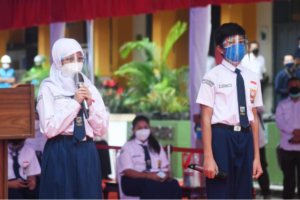Gov’t to Focus 2022 Non-Physical DAK on Four Educational Policies

Students talk to President Jokowi during vaccination drive for students conducted by the State Intelligence Agency (14/07/2021). (Photo by: Presidential Secretariat’s Press, Media, and Information Bureau/Lukas)
The Government has announced that the 2022 Non-physical Special Allocation Fund (DAK Nonfisik) in education sector will focus on four policies.
The four policies are as follows:
First, the distribution of the School Operational Assistance (BOS), Educational Operational Assistance (BOP) for Early Childhood Education (PAUD), and BOP for Degree Equalization (Packet A, B, C) will be directly transferred to the educational units in order to avoid transfer delays or the distribution will be three weeks earlier.
During a working meeting with the House of Representatives Commission X overseeing education on Tuesday (31/08/2021), Minister of Education, Culture, Research, and Technology Nadiem Makarim said that it will be an extraordinary achievement to help school principals and parents in remote areas not to cover the operational cost for education before the assistance is transferred.
Second, the amount of the BOP and BOS granting is based on the Construction Cost Index (IKK) and Student Index (IPD) in every regency/municipality.
For the record, in 2021 the amount of BOP granting distributed to each student for one year is equal in all regencies/municipalities, namely PAUD (Rp600,000), Packet A (Rp1.3 million), Packet B (Rp1.5 million), Packet C (Rp1.8 million).
In 2022, the BOP granting distributed to each student will be in a range of Rp600,000-Rp1.2 million for PAUD, Rp1.3 million-Rp2.6 million for Packet A, Rp1.5 million-Rp3 million for Packet B, and Rp1.8 million-Rp3.6 million for packet C.
Third, the expense of the BOS, BOP for PAUD, and BOP for Degree Equalization will be based on the schools’ needs. One of them is the fulfillment of the limited face-to-face learning’s (PTM) needs including
availability of sanitation and hygiene facilities, accessibility to health care facilities, implementation of strict health protocols, provision of body temperature gauges, and students mapping who will participate in the limited PTM.
On that occasion, Nadiem added that the expense of the BOS and BOP can be allocated to meet other the schools’ needs including new students admission, school libraries development, learning and extracurricular activities, learning assessment and evaluation, school administration support, teacher and education workers development, electricity and supporting services, school facilities maintenance, provision of multimedia learning tools, skills competency improvement for Vocational High School and Special Needs High School (SMALB) to be ready for job, and non-tenured teachers payment.
In the implementation of this policy, in order to digitalize, optimize the expense of the assistance and make the distribution more transparent, Nadiem encourages to carry it out online through the School Procurement Information System (SIPLah) application.
Fourth, the 2022 DAK Nonfisik in education sector will also focus on allowance for teachers in 2022 considering the number of teachers under the Contact-Based Government Employee (PPPK) system who are accepted this year. (PR of Ministry of Education and Culture/UN) (AP/MUR)








